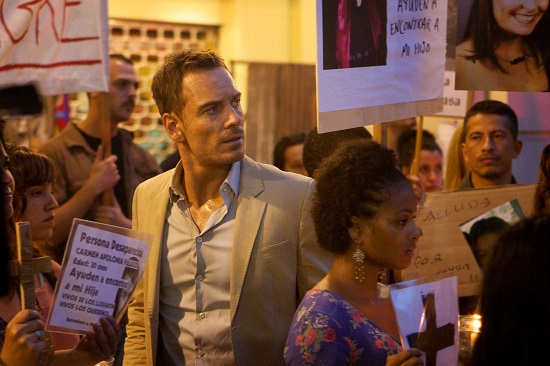When it was released in 2013, The Counselor drew reviews so scathing that they created a gaudy, repellent aura around the film. Yet in a peculiar way, this critical reception confirmed the film’s meanings. The world most critics and audience members are living in is a very different world to the one portrayed by The Counselor, and the people who called it incoherent, self-important, and pretentious, may have been unconsciously looking for ways to dismiss its bleakly seductive, existentially devastating vision. The Counselor is heavily stylized, but it’s also grimly real, and it doesn’t offer the sort of ironic detachment that audiences are used to getting from violent, nihilistic movies, post-Tarantino. Cormac McCarthy’s raw-boned stew was more than most moviegoers have the stomach for.
The film is stylized, and Ridley Scott’s direction is slick. The trailer for the film made it look like the kind of ultra-violent, nihilistic ‘jaunt’ Hollywood does so frequently and so poorly (most recently Seven Psychopaths). But the film is an odd mixture of overwrought with understated. It’s largely driven by dialogue, and the dialogue lays it on thick. Because of that, the action comes as visual punctuation to the quieter, conversational scenes. Scott’s tone is no more garish or pumped up for the violent scenes than for the slower, more contemplative ones. His touch isn’t subtle exactly, but it’s unobtrusive, and it’s a blessing because the material could have easily gone over the top, into unintentional parody. The film is funny (though not at its own expense), and that’s a blessing too, because without the humour, the relentless darkness of McCarthy’s vision would be oppressive and suffocating. Ridley Scott (who was seventy-five when the film was released) gets the tone just right.
One of the unusual things about The Counselor is that it opts to tell rather than show the most shocking elements of its narrative and yet is all the more disturbing for it. When Westray (Brad Pitt) warns the counselor not to imagine there’s anything these people (Mexican drug cartels) aren’t capable of, it’s the emphasis on this fact (which echoes John Huston’s famous speech from Chinatown) rather than any visible examples of it that’s the real horror. The way Pitt plays these scenes confirms what many of us probably suspect deep down, and its something that the film plays upon: we want to believe the worst about human depravity. The idea of people acting without any moral compass or checks or bounds is weirdly attractive to us because it’s so horrifying. But also the reverse: it’s horrifying because it’s attractive. In a world where everything is permitted, the only possible defence is to tell ourselves that none of it is true, that nothing is. That’s ironic detachment. The characters all have it, but few of them survive it.
The Counselor is like a soft, slow bullet that explodes inside us and spreads through our system, working its way into our consciousness like a virus and slowly taking it over, expanding and bringing areas of darkness to light. That’s not an entirely pleasant process, and The Counselor isn’t a pleasant movie. It will take a few years, or even decades, before it’s recognized for what it is — an unpleasantly accurate depiction of our times. (That’s if there’s anyone left to recognize it.)
As a vision of evil The Counselor is completely persuasive. Its depiction of soullessness as eerily sumptuous, even sickly erotic, of moral incoherence as the driving force behind civilization, makes it almost Lovecraftian. With its relentless, seductive insistence on horror as the soul of the plot, it may be the first truly postmodern horror film. By going all the way into the nihilistic perspective of a godless universe, it achieves what Coppola failed so spectacularly to do with Apocalypse Now, and takes us all the way into the American heart of darkness.
And—surprise, surprise—it’s in Mexico.
*
Although it draws on current history and largely-ignored political realities, The Counselor isn’t the kind of socially conscious movie that obliges audiences to think deeply about its subject matter. It’s not Schindler’s List, Gandhi, or Philadelphia, and it almost dares us to take it seriously at that level. And these aren’t social issues that most critics, especially American critics, are willing to look at; and even if they were, the publications they write for probably wouldn’t allow it. (One feature of the reviews of The Counselor, negative and occasionally positive, is that few if any of them referred to the real-world events which the film uses for its storyline.)
The Counselor is a message movie of a particular sort, an anti-message movie. Potentially, it works as an enema to flush out all of those Hollywood poisons until there’s no movie junk left. The message of The Counselor is the message that all the other movies are working overtime to drown out of our awareness. It’s the inescapable truth which empire upon empire (including the Hollywood empire) was created to keep out, like barbarian hordes threatening to tear down everything the inhabitants hold sacred and good — giving the lie to Hollywood’s golden promise of heaven for all good Christian soldiers, and eternal damnation for everyone else.

On the other hand, the film does offer a dim ray of hope, a crack in the barrel, a possible way through the unremitting darkness that follows “the extinction of all reality.” At the start of the film, the diamond dealer (Bruno Ganz) assures the counselor (Michael Fassbender) that “At our noblest we announce to the darkness that we will not be diminished by the brevity our lives.” Jefe (Rubén Blades) tells the counselor the story of the poet Arturo Machado, who only became a poet after his beloved died prematurely. “I’m not going to become a poet,” the counselor replies grimly. Jefe assures him it wouldn’t help him if he did, yet the point has been made. The reference to the despised, buried philosopher’s stone which reveals the true nature of all our plans indicates that there is a treasure to be found, once all hope and meaning — “all reality” — has been cruelly and irrevocably extinguished.
The counselor’s world (which is also our world — there’s only one) is built on the blind exploitation of others for the sake of personal self-gratification, a world in which the human soul has been harnessed to maquiladoras and become fuel for the most depraved kind of dreaming. The price of unchecked greed is never-ending grief. The world of The Counselor may seem to some viewers disproportionately bleak; one particularly obtuse critic complained that “The milk of human kindness does not flow through The Counselor’s veins, not even close.” But The Counselor isn’t about the milk of human kindness (not even close). It’s about a soul-deep corruption that’s reflected by social, political realities, by historical facts. (To give one example: Ciudad Juárez, where The Counselor’s deadly drug cartel is located, has been known in Mexico since the early 1990s as “the capital of murdered women.” According to a 2011 article in The New Statesman, ‘Mexico’s Disappeared Women’, locals believe the killings are “a form of blood sport for the city’s elite,” and/or related to satanic cults, snuff films and organ theft.)
Naivete and cynicism are synonymous in The Counselor because it’s naive — fatally naive — to think we can gratify our own desires regardless of the cost to others and get away clean. There’s always a bigger predator out there, and it will always find us eventually. The bigger we get, the tastier we look. Cynicism sets us up for the axe-fall; naivete means we don’t see it coming until it’s too late.
Audience members and critics may have actively resented a movie that required them to think in ways they weren’t accustomed to thinking and that make them uncomfortable. They may have had difficulty getting to grips with a movie that’s really about something and that doesn’t tell them how to feel about it. The Counselor doesn’t have the built-in mechanism of films like American Beauty, Unforgiven, or 12 Years a Slave that allows viewers to congratulate themselves for their sensitivity and intelligence in embracing difficult or radical subject matter. These films prop up the culture that spawns them and subtly (or not-so-subtly) promote dominant values while appearing to subvert them. The Counselor breaks the rules of engagement between viewer and content, not only by ignoring the narrative conventions (a heist movie without a heist, a hero who is no more than a witness to the consequences of his own poor judgement and inadequacy), but because it doesn’t offer the satisfaction of a resolution. The protagonist doesn’t rescue the girl; he doesn’t go on a mad killing spree to avenge her. He’s swallowed up by grief and implodes in a dirty hotel room, exactly like any of us would.
The horrors which the film piles up don’t lead to any kind of catharsis — and catharsis is the unwritten, sacrosanct promise of every Hollywood action movie (and even of Hollywood ‘issue’ movies). The film builds the internal tension to bursting point without ever providing release, emotional or otherwise. It leaves us with a knot in the gut that nothing can get rid of except amnesia or suppression.
Ironic detachment is the way most sophisticated people keep from being overwhelmed by existential horror and moral revulsion as the facts of life unfold around them. Ironic detachment is made easy by movies and TV shows (Breaking Bad was all ironic detachment), because they allow us to feel like we’re being exposed to life’s brutal, bleak realities (violence, corruption, drug addiction, disease, poverty, insanity, and moral collapse) without ever having to feel the brunt of them. This creates a seen-it-all superiority and cynicism that’s at the same time naive, because it magically locates all the horror outside of our own direct experience, on the other side of a movie, TV, or Ipod screen. The entertained, meanwhile, enjoy the luxurious detachment of the consumer lifestyle that’s been assembled for them, by and through and as a result of all that corruption being miraculously recycled as entertainment.
The Counselor may not be art — it appears to partake of, even revel in, the same depravity it exposes — but then, it’s depicting a world in which corruption has gone so deep that culture and rot are synonymous. There’s no art possible that doesn’t stem from, and subtly promote, moral decay. If we let The Counselor’s dark truth all the way in, we would never watch another Hollywood movie again.
Jasun Horsley is the author of Seen & Not Seen: Confessions of a Movie Autist (here) You can follow in on twitter @Jakephas. A longer version of the above article (with a lot more spoilers) can be seen here.


